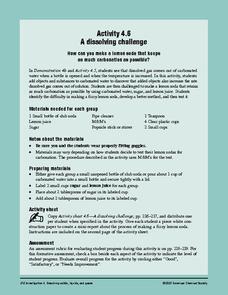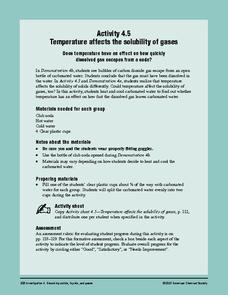Curated OER
Suspensions and solutions
Students create mixtures of baking soda, baking powder, flour, and more to predict which are solutions and which are suspensions. Students follow 4 directions and answer 3 questions.
Curated OER
Baking Soda and Vinegar Volcano
Students construct a volcano using baking soda and vinegar. In this earth science lesson plan, students explain the reaction that takes place when these two chemicals combine together.
CK-12 Foundation
Function Rules for Input-Output Tables: Soda Sugar Function Table
Examine the relationship between the input and output variables in a table of values. As learners build an input-output table using online manipulatives, they begin to identify patterns. They answer questions about these patterns...
Curated OER
Properties and Perfectly Polymeric Sodas
Students examine physical and chemical properties of plastics, interfaces of plastics, and forms of plastics. In three lab activities, students discover the two characteristic responses of plastics to heating, thermoplastic or...
American Chemical Society
Change in Temperature - Exothermic Reaction
Alone, or as part of the intended unit on chemical reactions, this activity allows learners to experience an exothermic reaction. Here, learners add calcium chloride to a baking soda solution and watch the temperature rise! They will...
American Chemical Society
A Dissolving Challenge
After collecting carbon dioxide bubbles from a cup of club soda, learners attempt to make their own lemon soda while preventing the loss of carbonation. They do so by creating a syrup before mixing the substances into the club soda....
American Chemical Society
Production of a Gas - Controlling a Chemical Reaction
Though the publisher designated this unit for use with third through eighth grades, this particular lesson plan would be best used with middle schoolers due to the specific measurement skills required. Basically, they set up the reaction...
American Chemical Society
Can Gases Dissolve in Water?
Why does soda fizz when opened? Learners discuss the appearance of bubbles in soda bottles when opened. In groups, they design and complete an experiment comparing the amount of carbon dioxide dissolving in cold versus hot liquids.
American Chemical Society
Change in Temperature - Endothermic Reaction
Now that learners have been exposed to chemical changes, they learn that some take in heat and therefore, decrease in temperature. The same reaction that they have been investigating between baking soda and vinegar is revisited,...
Curated OER
Determining the Density of a Liquid
Young scholars find the density of diet soda and regular soda. In this density lesson plan, students measure the mass of a graduated cylinder with 10 different volumes of each soda. They find the mass of the liquid alone and use the...
American Chemical Society
Powder Particulars
By both demonstration and hands-on investigation, physical science fanatics come to know that some materials react when they come together. Adding vinegar to both baking soda and to baking powder, the difference between the two is clear....
American Chemical Society
Temperature Affects the Solubility of Gases
Dare your class to drive dissolved carbon dioxide out of carbonated liquid at different temperatures to discover if there is a difference in rate. To make this experiment more sound, have explorers use equally measured amounts of soda...
American Chemical Society
Controlling the Amount of Products in a Chemical Reaction
Everyone enjoys combining baking soda and water. Here is a lesson plan that challenges scholars to analyze the reaction three different ways — the real substances, the chemical equation, and the molecular models....
Curated OER
Greenhouse Effect: Pop Bottle Experiment
Young scholars explore global warming by conducting a weather experiment. In this greenhouse gas lesson, students define the greenhouse effect and the impact on our ozone layer. Young scholars utilize a soda pop bottle, floodlight bulb,...
American Chemical Society
Changing the Density of an Object - Adding Material
In this sixth of seven activities revolving around the concept of density, physical science fans figure out if anything can be done to change the density of an object. Demonstrate by placing a can of regular and a can of diet soda into a...
Curated OER
Density Studies of the Earth
Density comes to life as investigators place soda cans into containers of various liquids to find if they sink or float. They layer different density liquids, compare densities of different gases, and more. A total of six different...
NASA
Pop Can Hero Engine
Hang a soda can from a string and watch it spin by the force created by water streaming out of slanted holes. This plan provides background information, detailed materials and procedures, discussion questions, a lab worksheet, and...
Curated OER
Water Cycle Lesson Plan
After conducting experiments with a sponge, ice water, and a soda bottle your young scientists become familiar with the water cycle through experiment, song, hand motions and drawing. Young scholars sing about the water cycle and...
Earth Day Network
Staying Green While Being Clean
Clean up the environment with a activity that focuses on replacing hazardous cleaning supplies with green, environmentally-friendly products. Using a dirty patch of surface as a control area, kids clean other parts of various...
Columbus City Schools
ABC: Acid Base Chemistry
Bubble, bubble, boil and trouble! What causes common substances like baking soda and vinegar to react the way they do? Welcome your junior chemists to the wonders of acid-base chemistry using a comprehensive and fun...
Curated OER
Lake Strata and Internal Waves
Use the classic density demonstration of placing a cola, a clear soda, and a diet soda into a tank of water. Then let learners attempt to pour some of the soda into layers in a clear container. The procedure explains a thermocline, and...
Bowland
Soft Drinks
"Statistics are no substitute for judgment" - Henry Clay. Young mathematicians use provided statistics from a soda taste test to explain why conclusions are faulty. They devise a new test that would be more appropriate than the one given.
Curated OER
Understanding Lava Layers
Seventh graders view "Volcano" by National Geographic Video. They experiment with baking soda and study lava flow. They describe volcano and earthquake patterns. They analyze weather and climate changes and how they relate to the natural...
Perkins School for the Blind
Conservation of Mass
How do you teach a student with visual impairments about the conservation of mass? You use tactile models that represent the theoretical concept. Baking soda and vinegar are used to add gas to a deflated balloon. Learners will feel the...
Other popular searches
- Soda Pop
- Baking Soda
- Baking Soda and Balloons
- Baking Soda and Vinegar
- Tooth Decay Experiment Soda
- Soda Bottle Hydrology
- Comparing Soda
- Baking Soda Volcano
- Soda Bottle Terrarium
- Baking Soda in Flour
- Soda Pop Science
- Baking Soda Vinegar

























